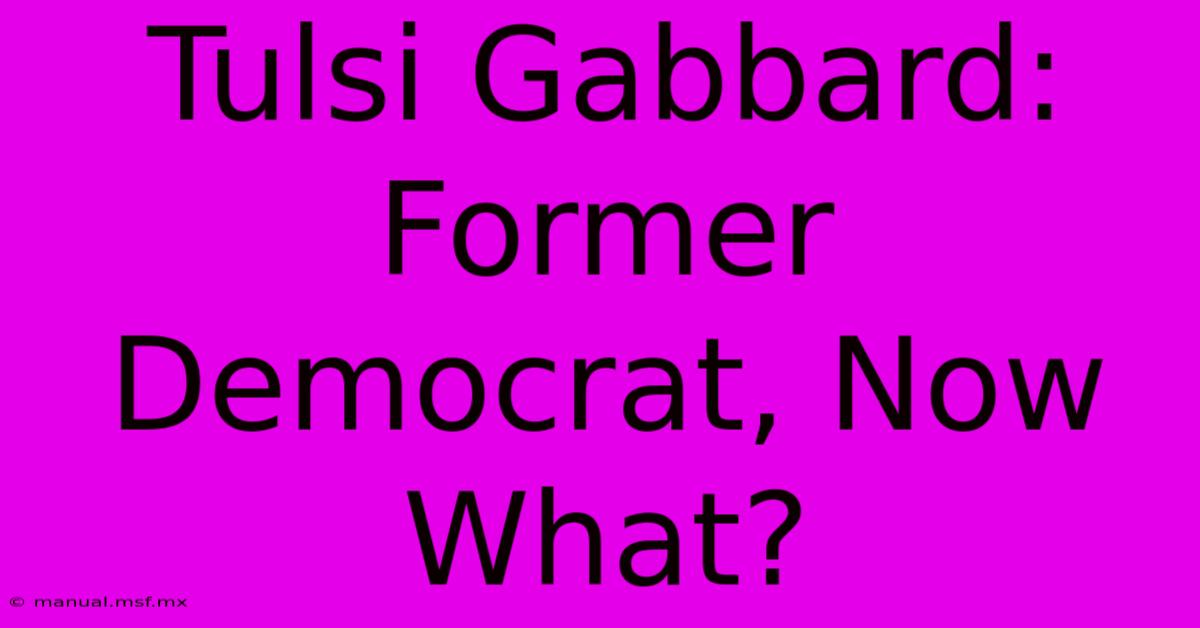Tulsi Gabbard: Former Democrat, Now What?

Discover more detailed and exciting information on our website. Click the link below to start your adventure: Visit Best Website. Don't miss out!
Table of Contents
Tulsi Gabbard: Former Democrat, Now What?
Is Tulsi Gabbard's political future a mystery? She's left the Democratic Party, but what does this mean for her political future? Understanding this move requires a deep dive into her political journey and its implications.
Editor Note: Tulsi Gabbard's recent departure from the Democratic Party has generated much discussion and speculation. This article explores her past, present, and potential future.
This development is crucial for understanding contemporary American politics, as Gabbard's outspoken views on foreign policy, social issues, and the Democratic Party itself have made her a polarizing figure.
Analysis: We've carefully analyzed Gabbard's statements, actions, and political trajectory to understand the motivations behind her decision to leave the Democratic Party. We've also considered the potential impact of her move on the political landscape, focusing on her future role and the implications for both Democrats and Republicans.
Key Considerations of Tulsi Gabbard's Departure:
| Category | Details |
|---|---|
| Political Affiliation | Former Democrat, now independent |
| Motivations | Disillusionment with Democratic Party's direction, perceived anti-war stance, critique of "woke" culture |
| Impact on Democrats | Potential loss of moderate voters, intensified internal party divisions |
| Impact on Republicans | Potential opportunity for recruitment, need to address ideological differences |
| Future Role | Unclear, but possibilities include third-party candidacy, political commentary, advocacy |
Tulsi Gabbard: A Look Back
Gabbard's political journey has been marked by both controversy and consistency. She served as a Democratic member of the U.S. House of Representatives from Hawaii, followed by a stint as a representative in the Hawaii State House.
Early Political Career:
- Focus: Gabbard initially focused on environmental issues and animal welfare, aligning with traditional Democratic values.
- Rise: She rose quickly through the ranks, becoming the youngest member of the Hawaii State House.
- Military Service: She joined the U.S. Army National Guard, a decision that shaped her views on foreign policy.
Shift in Political Focus:
- Foreign Policy: Gabbard became known for her anti-war stance, criticizing U.S. interventionism and advocating for diplomacy.
- Criticism: She faced criticism from fellow Democrats for her meetings with Syrian President Bashar al-Assad and her opposition to the Obama administration's foreign policy.
- Presidential Campaign: Her 2020 presidential campaign further solidified her image as a political outsider, challenging establishment narratives.
The Democratic Party Divide:
- Dissatisfaction: Gabbard voiced increasing dissatisfaction with the Democratic Party's direction, particularly its handling of foreign policy and its embrace of progressive ideologies.
- "Woke Culture": She criticized "woke" culture, arguing it fostered division and stifled open dialogue.
- Party Platform: She felt the party platform no longer represented her values.
Departure and Future:
- Resignation: Gabbard's resignation from the Democratic Party was a significant event, highlighting the growing divide within the party.
- Independent: She is now an independent, a status that allows her to operate outside traditional party constraints.
- Political Future: Her future remains uncertain, but it could involve a third-party candidacy, political commentary, or advocacy.
Exploring the Significance:
The Democratic Party: Gabbard's departure underscores the challenges facing the Democratic Party in maintaining unity and appealing to a broad spectrum of voters. Her criticisms about "woke" culture and foreign policy highlight growing internal divisions within the party.
The Republican Party: The Republican Party may see an opportunity to attract Gabbard and her supporters, but they will need to address potential ideological differences and navigate the complexities of her political identity.
Independent Politics: Gabbard's move represents a potential shift towards independent politics, signaling a growing dissatisfaction with traditional party structures and a desire for alternative viewpoints.
Moving Forward:
Tulsi Gabbard's decision to leave the Democratic Party is a complex issue with far-reaching implications. Understanding her motivations, the political climate, and potential future scenarios is crucial for discerning the impact on American politics. The coming years will reveal whether her departure sparks a wider movement towards independent politics or simply reinforces existing partisan divisions.

Thank you for visiting our website wich cover about Tulsi Gabbard: Former Democrat, Now What?. We hope the information provided has been useful to you. Feel free to contact us if you have any questions or need further assistance. See you next time and dont miss to bookmark.
Also read the following articles
| Article Title | Date |
|---|---|
| Defender Earns Another Australia Call Up | Nov 14, 2024 |
| Mc Cains Historic Night For 76ers Vs Cavs | Nov 14, 2024 |
| R55 000 Cat Haircut Wasim Akrams Story | Nov 14, 2024 |
| The Addams Family Live At Voorhees High | Nov 14, 2024 |
| Presidencia Municipal Tulancingo Dia De La Diabetes | Nov 14, 2024 |
| Dogecoin Soars On Trumps Efficiency Plan | Nov 14, 2024 |
| Sony Winst Groeit Door Muziek En Games | Nov 14, 2024 |
| Saudi Vs Australia Key Match Preview | Nov 14, 2024 |
| Dia Mundial Diabetes Controles Salud Plaza Roca | Nov 14, 2024 |
| Police Chanel Maya Banks Not Missing | Nov 14, 2024 |
